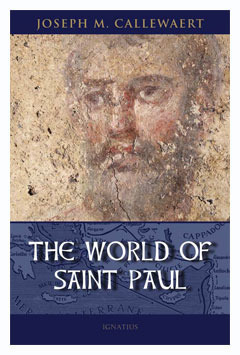"God Created Saint Paul and Then Broke the Mold": An Interview with Joseph M. Callewaert

"God Created Saint Paul and Then Broke the Mold": An Interview with Joseph M. Callewaert, author of The World of Saint Paul | Ignatius Insight
Ignatius Insight: What inspired you to write a book about St. Paul?
Callewaert: First, Paul has always intrigued me. I read about him, of course, in the Acts of the Apostles—fascinating reading—which prompted me to go on to his Epistles. I tried to read them in French, English, Latin and Greek. And here I hit a wall.
I had a hard time following his argumentation,in my own French cartesian mind, with his peremptory affirmations and abrupt"diatribes". The succession of his arguments is not  always clear in its logic and pertinence. For example why does his first Letter to the Corinthians presents us, besides great thoughts about the Cross and the Resurrection, exhortations on celibacy, marriage, pagan courts and food? Furthermore, to add to the confusion, he supports his affirmations with obscure quotations from the Old Testament taken from the Greek Septuagint and probably badly translated in English.
always clear in its logic and pertinence. For example why does his first Letter to the Corinthians presents us, besides great thoughts about the Cross and the Resurrection, exhortations on celibacy, marriage, pagan courts and food? Furthermore, to add to the confusion, he supports his affirmations with obscure quotations from the Old Testament taken from the Greek Septuagint and probably badly translated in English.
And so, for years, I struggled with my St. Paul, reading books about him and his "world", mostly in French but also in English, in German,consulting commentaries, improving my knowledge of Greek, until I could decipher this pharisian, a rock as hard as a precious stone, which the grace (kharis) of Christ has sculpted, respecting his nature, to create an amazing man of God, a religious genius, whose influence has not waned over all these centuries.
Second. It is really the world upside down.
Here we have this sect of followers of Jesus who insist he is the Messiah resuscitated and gone to heaven. Their leaders are Peter, the rock, who is starting to effectively occupy the central role and there is also John and James. John, the favorite disciple, could have occupied the second position but he is left discreetly in the shadow.
And what happens? It is Paul of Tarsus, who had not known Christ before the Ascension, that the same Jesus moves forward, presenting him as the "Apostle to the Nations".
He is immediately involved in controversy. You can see the hatred Paul arouses among his enemies, and tensions and misunderstandings he brings about among his co-workers and friends. The Apostle James (the son of Alpheus) or at least his entourage are concerned, for doctrinal reasons, about Paul's missionary activities. A serious disagreement with Barnabas breaks open on the subject of John-Mark and they separate forever, just before the second missionary journey. And there is the confrontation with Peter about the future of the mission to the Gentiles.
Carl E. Olson's Blog
- Carl E. Olson's profile
- 20 followers



